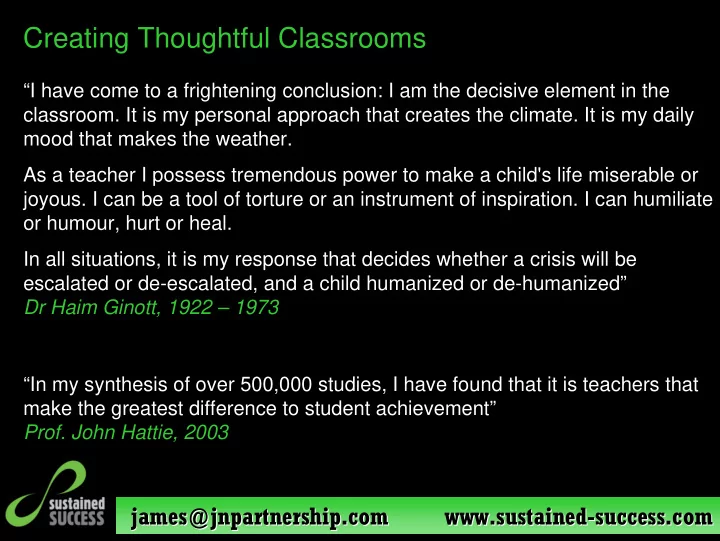

Creating Thoughtful Classrooms “I have come to a frightening conclusion: I am the decisive element in the classroom. It is my personal approach that creates the climate. It is my daily mood that makes the weather. As a teacher I possess tremendous power to make a child's life miserable or joyous. I can be a tool of torture or an instrument of inspiration. I can humiliate or humour, hurt or heal. In all situations, it is my response that decides whether a crisis will be escalated or de-escalated, and a child humanized or de-humanized” Dr Haim Ginott, 1922 – 1973 “In my synthesis of over 500,000 studies, I have found that it is teachers that make the greatest difference to student achievement” Prof. John Hattie, 2003 james@jnpartnership.com www.sustained- -success.com success.com james@jnpartnership.com www.sustained
LEVELS OF PERSPECTIVE (Daniel Kim) Vision L E Mental Models V E Systems & Structures R A Patterns of behaviour G E Events james@jnpartnership.com www.sustained- -success.com success.com james@jnpartnership.com www.sustained
Influences on Student Learning by Prof John Hattie, 2003 “In my synthesis of over 500,000 studies, I have found that it is excellence in teachers, not just the teachers themselves, that makes the greatest difference to student achievement” Key Factors in Expert Teaching: � Challenge � Feedback � Deep Representations (of key concepts) “These three (factors) can successfully classify 80% of the teachers correctly, so are probably sufficient to highlight the major differences between expert and experienced teachers.” james@jnpartnership.com www.sustained- -success.com success.com james@jnpartnership.com www.sustained
Compare and Contrast What are the similarities and differences between Daisy the cow, a tractor and Mr Grass Head? james@jnpartnership.com www.sustained- -success.com success.com james@jnpartnership.com www.sustained
Skills of Thinking P rocessing information Locate RELEVANT info; COMPARE, CONTRAST, SORT, CLASSIFY and SEQUENCE R easoning Use SUPPORTING REASONS, PRECISE LANGUAGE, INFERENCES & DEDUCTIONS I nquiring Ask relevant QUESTIONS, DEFINE problems, PREDICT outcomes, TEST conclusions C reativity Look for ALTERNATIVES and POSSIBILITES, GENERATE IDEAS & HYPOTHESES E valuating Develop CRITERIA for JUDGING VALUE of work & GENERATE RICH FEEDBACK james@jnpartnership.com www.sustained- -success.com success.com james@jnpartnership.com www.sustained
Clarity 1 1. Concept Confusion 2. Conflict 2 james@jnpartnership.com www.sustained- -success.com success.com james@jnpartnership.com www.sustained
Primary P4C Concepts Me Fairness Real Language Home Telling lies Growth/Change Same Pets Emotions Friends Thinking Being nice Dreaming james@jnpartnership.com www.sustained- -success.com success.com james@jnpartnership.com www.sustained
Secondary P4C Concepts Democracy Culture Fairness Language Hero Morality Identity Beauty Knowledge Number Proof Names Poetry Reality james@jnpartnership.com www.sustained- -success.com success.com james@jnpartnership.com www.sustained
3 weeks 2 years old 4 years old Adult old What makes you, you? Are you the same person you were when you were a baby? If you had a different name, would you be a different person? When you play make believe, are you still you? james@jnpartnership.com www.sustained- -success.com success.com james@jnpartnership.com www.sustained
HANDY HINTS: A = B Friend Trust If A = B then Does B = A? Trust Friend For example … james@jnpartnership.com www.sustained- -success.com success.com james@jnpartnership.com www.sustained
HANDY HINTS: NOT A Friend Trust If A = B then If it’s NOT B, is it NOT A? Trust Friend For example … james@jnpartnership.com www.sustained- -success.com success.com james@jnpartnership.com www.sustained
Eureka! 3 Clarity 1 1. Concept Confusion 2. Conflict 3. Construct 2 james@jnpartnership.com www.sustained- -success.com success.com james@jnpartnership.com www.sustained
Meta cognition 4 3 Clarity 1 1. Concept 2. Challenge Confusion 3. Construct 2 4. Consider james@jnpartnership.com www.sustained- -success.com success.com james@jnpartnership.com www.sustained
(P) Review What do we want S to know? What do we need to know? Science – Habitats K A Maths - Shape james@jnpartnership.com www.sustained- -success.com success.com james@jnpartnership.com www.sustained
Dreaming • What is a dream? • Is dreaming the same as thinking? • Do you have to close your eyes to dream? • Do you have to be asleep to dream? • Do you dream in pictures? Are they colour or black and white? • Do animals dream? james@jnpartnership.com www.sustained- -success.com success.com james@jnpartnership.com www.sustained
Fairness • Does fair mean being the same as someone? • Or does it mean everyone having the same things? • How do you know if something’s fair or not? • Why should people try to be fair? • What is unfair? • If Lucy nips Amy, is it fair for Amy to nip Lucy? james@jnpartnership.com www.sustained- -success.com success.com james@jnpartnership.com www.sustained
Knowledge Is knowledge the same as knowing? eg If I know your name (knowledge), does that mean I ‘know’ you? If ‘knowledge’ is later proved to be wrong, was it ever knowledge? Eg Knowledge that the world was flat Can you understand something without having knowledge about it? Eg Young children understanding language without having knowledge about it james@jnpartnership.com www.sustained- -success.com success.com james@jnpartnership.com www.sustained
james@jnpartnership.com www.sustained- -success.com success.com james@jnpartnership.com www.sustained
james@jnpartnership.com www.sustained- -success.com success.com james@jnpartnership.com www.sustained
james@jnpartnership.com www.sustained- -success.com success.com james@jnpartnership.com www.sustained
“You might think that students who were highly skilled would be the ones who relish a challenge and persevere in the face of setbacks. Instead, many of these students are the most worried about failure and the most likely to question their ability and to wilt when they hit obstacles” Self Theories: Their role in Motivation, Personality and Development (C arol Dweck, 1999) james@jnpartnership.com www.sustained- -success.com success.com james@jnpartnership.com www.sustained
Recommend
More recommend